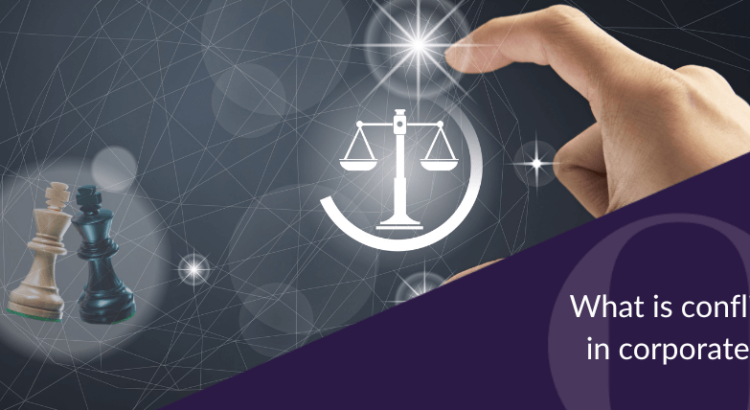Management of conflict of interest (COI) plays a pivotal role in the complex corporate governance landscape. Business professionals may ask, what is a conflict of interest in corporate governance? At its core, a COI arises when an individual’s personal interests may potentially clash with their professional duties, posing thorny ethical and legal challenges for businesses. Effectively addressing these conflicts is paramount to maintaining business integrity and ensuring compliance with stringent regulatory frameworks in Singapore.
Identifying and mitigating conflicts of interest is a cornerstone of ethical business conduct. Effective management of conflicts of interest prevents personal interests from undermining corporate decisions, thereby upholding the organisation’s integrity. As businesses navigate these challenges, having a robust COI policy and management processes become essential.
In this article, we examine the intricacies of conflict of interest and its part in good corporate governance. We’ll explore the essential elements of an effective COI policy, as well as the potential penalties for mismanagement.
What Managing Conflict of Interest Means in Business
Managing conflict of interest at the board level is crucial for upholding ethical standards and ensuring effective corporate governance. A robust COI policy not only helps companies comply with the law and directors with their fiduciary responsibilities, but also fosters a culture of transparency and integrity within the organisation.
Ngiam May Ling, Associate Director of Corporate Secretarial at BoardRoom Group, emphasises the importance of clarity and education in defining and managing COIs: “A robust company COI policy should promote ethical behaviour and provide clear definitions of what constitutes a COI. It should offer examples to educate employees and directors on recognising and disclosing potential conflicts.”
What is a Conflict of Interest?
A conflict of interest typically arises when an individual’s or organisation’s private interests might benefit from actions or decisions made in their official capacity vis-à-vis another business entity. These conflicts can lead to unethical behaviour, such as favouritism or unfair treatment, which compromises the integrity and objectivity of decisions.
Three key examples of conflict of interest are:
- using company resources for personal gain;
- engaging in business activities that compete with the company; and
- making decisions that benefit related parties at the expense of the company’s interests.
Consider the case of a CEO who received personal loans and referral fees for directing investments into another company. The CEO failed to disclose and appropriately manage these conflicts of interest, thereby concealing these activities. This situation represents a conflict of interest as the CEO prioritised personal financial gain over the best interests of the company and its stakeholders, violating legal and ethical standards. This example demonstrates a breach of corporate governance principles and underscores the importance of transparency and proper conflict of interest management.

Key Components of an Effective COI Policy
A well-crafted company conflict of interest policy serves two important purposes: risk mitigation and fostering transparency and trust. By identifying and managing conflicts early, companies mitigate the risk of biased decision-making that could undermine corporate objectives.
Transparent COI management and a robust COI policy instill confidence in stakeholders – shareholders, employees and customers – by demonstrating that the company operates with integrity and accountability.
The key components of an effective COI policy include:
- Purpose
- Scope
- General responsibilities
- Managing COI
- Monitoring COI
- Breach of policy
- Diagrammatic process flow for the COI process
- COI declaration form
- Recusal process
Implementation Process
Implementing an effective COI policy involves proactive measures to prevent conflicts from escalating.
May Ling explains the practical steps:
“Directors should disclose any potential or perceived conflicts during board meetings. This includes business relationships or personal interests that could influence decision-making. Continuous monitoring and assessment by the Audit Committee or any other committee that oversees the ethics of the company ensure that mitigation actions are promptly taken.”
May Ling underscores the necessity of proactive COI management:
“Identifying and managing conflicts of interest prevent biased decision-making that could harm the company. It ensures that directors act in the best interests of all stakeholders, safeguarding the company’s reputation and long-term success.”
However, she makes this important distinction: “What is perceived as a conflict of interest may not necessarily constitute a conflict of interest to the company. What’s important is that the director takes the step to disclose. It’s up to the company to decide whether it does constitute a conflict of interest or not.”
By clearly defining COIs, implementing transparent disclosure processes and enforcing rigorous monitoring, companies can uphold integrity while effectively navigating complex business landscapes.

Conflict of Interest Consequences
As we saw in the earlier conflict of interest example, failing to manage conflicts of interest adequately satisfactorily can lead to long-lasting repercussions that extend beyond financial penalties.
May Ling highlights the broader consequences:
“The reputation of a company is paramount. Inadequate COI management can tarnish reputation and lead to financial losses. Regulators may impose sanctions depending on the severity of the breaches. More significantly, loss of stakeholder confidence can be challenging to regain.”
The following scenarios illustrate the potential impact of conflict of interest mismanagement:
- Financial impact: A company involved in a conflict of interest scandal may face financial repercussions due to reduced investor confidence and market trust.
- Regulatory scrutiny: Depending on the severity of the breach, regulators may investigate and penalise companies for failing to disclose or manage conflicts appropriately.
- Long-term reputational damage: Stakeholder trust, once lost, can be difficult to recover.
May Ling emphasises the lasting implications. “Rebuilding trust requires consistent ethical practices and transparent governance over a prolonged period of time,” she says.
Strategies for Effective COI Management
Managing conflicts of interest in corporate governance involves identifying and addressing potential conflicts before they affect decision-making. Clear policies, disclosure, recusal protocols and independent advice are essential strategies. Establishing and updating these frameworks ensures transparent and ethical governance.
To mitigate the risks, companies must implement conflict of interest policies that include:
- Clear disclosure requirements: Establish clear guidelines for directors and employees to disclose potential conflicts of interest.
- Regular training and education: Conducting regular training sessions to educate stakeholders on COI policies and ethical standards.
- Transparency and accountability: Maintaining transparency in decision-making processes and holding individuals accountable for adhering to COI policies.
- Recusal process: Directors and employees must promptly disclose any actual, potential, or perceived COIs as soon as they are aware of them. This includes conflicts arising from personal, financial, or familial relationships. The individual must recuse themselves from all discussions, deliberations, and voting on matters related to the identified conflict. They should not attempt to influence the decision in any way, either directly or indirectly.

Managing Conflict of Interest as Part of Corporate Governance
Navigating the complexities of conflict of interest is essential for upholding ethical standards and ensuring legal compliance within corporate governance frameworks.
As businesses strive to strengthen their corporate governance practices, outsourcing to experienced professionals like BoardRoom offers significant advantages.
“BoardRoom provides specialised knowledge and tailored solutions to navigate regulatory changes and provide independent oversight,” says May Ling. “With extensive experience across various industries, we advise companies on best practices to strengthen their governance frameworks.”
We prioritise comprehensive policy development and procedural adherence over mere compliance. This approach ensures that our clients not only meet regulatory requirements but also establish robust governance practices.
For more information on how BoardRoom can support your corporate governance needs, visit BoardRoom’s corporate secretarial services. Partner with us to elevate your governance standards and build enduring stakeholder trust.
Contact BoardRoom for more information:
Related Business Insights
-

17 Oct 2024
Payroll Best Practices: Your Guide To Financial Services Payroll Management
Effective payroll management in financial institutions is key to compliance and risk reduction. Find out what you c …
READ MORE -

07 Oct 2024
Your Guide to Global Mobility Tax Solutions
Discover ways to navigate tax and compliance when working with international assignments with global mobility tax s …
READ MORE -

06 Sep 2024
Case Study: Optimising Tax Efficiency in Profits Repatriation
Discover how BoardRoom's two-step tax approach helps a multinational conglomerate evaluate tax-efficient profit rep …
READ MORE


